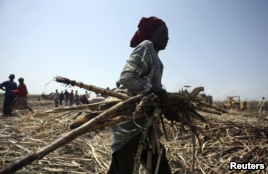VOA慢速英语:Life Not So Sweet for Nigerian Sugar Farmers
From VOA Learning English, this is the Agriculture Report in Special English.
Farmers in northern Nigeria say their land could be some of the most productive for sugar in West Africa. But they say that productivity is wasted without big local buyers.
The Nigerian government has a new plan designed to help the local industry. For now, farmers sell sugar cane as snacks on the street while the country imports 97 percent of the sugar it uses.

A laborer gathers sugarcane at a commercial farmland in Numan community, Adamawa state, northeast of Nigeria, Nov. 2009.
Mallam Usman Abdu Gubuci has five hectares of land. He describes himself as one of the sugar farming "giants" in his area. He says his part of northern Nigeria could be a major supplier of sugar to West Africa. But he says farmers no longer even bother to grow sugar that can be refined.
"There is special sugar cane for that sugar, which we were introduced with. But when we planted it, no buyer. In other words, no industry to buy it."
Instead, he says, all of his product goes to local markets, and people drink sugar water from the sugar cane stalks. And while these stalks do sell, he says, it is not a business that can grow.
Last fall, the Nigerian government introduced a plan to decrease sugar imports and boost Nigerian production. The plan includes increasing taxes on imported sugar and giving tax breaks to anyone who wants to invest in local sugar refinement. It also calls for no import duties on machinery used for processing sugar.
Sugar officials say Nigeria spent $620 million on sugar imports in 2012. They do not expect that number to go down immediately.
Hajiya Bilkisu Mohammed heads the Association of Women Farmers in northern Nigeria. She says part of the reason local farmers cannot sell sugar for refining is that factories in this part of Nigeria face continual electrical shortages. The factories depend on costly power generators.
Saidu Usman Gwambe is a sugar cane farmer. He says his land could be very profitable, but he is not sure how much longer he can wait for a government rescue.
In recent months the Nigerian government has also announced plans to reduce imports of other food products. In January, President Goodluck Jonathan promised to increase food production by 20 million metric tons by 2015. Doing this, he says, will create 3.5 million jobs and reduce Nigeria's dependence on imports.
And that's the VOA Special English Agriculture Report. I'm Karen Leggett.
- 频道推荐
- |
- 全站推荐
- 推荐下载
- 网站推荐




















